Entrepreneurship and Small Business Management Report: An Analysis
VerifiedAdded on 2021/01/02
|17
|5047
|121
Report
AI Summary
This report provides a comprehensive analysis of entrepreneurial ventures, encompassing various types such as small businesses, large businesses, scalable start-ups, and social entrepreneurship. It delves into the similarities and differences between these ventures, examining their goals, capital providers, and outcomes. The report assesses the significant impact of micro and small businesses on economic growth, highlighting their contribution to employment and revenue generation. Furthermore, it explores how small businesses and new start-ups will contribute to economic growth in the context of Brexit. The report also defines the skills, traits, and characteristics of successful entrepreneurs and examines how background and experience can either hinder or foster entrepreneurial activities, offering valuable insights for aspiring entrepreneurs and business students.

Entrepreneurship and Small Business
Management
Management
Paraphrase This Document
Need a fresh take? Get an instant paraphrase of this document with our AI Paraphraser
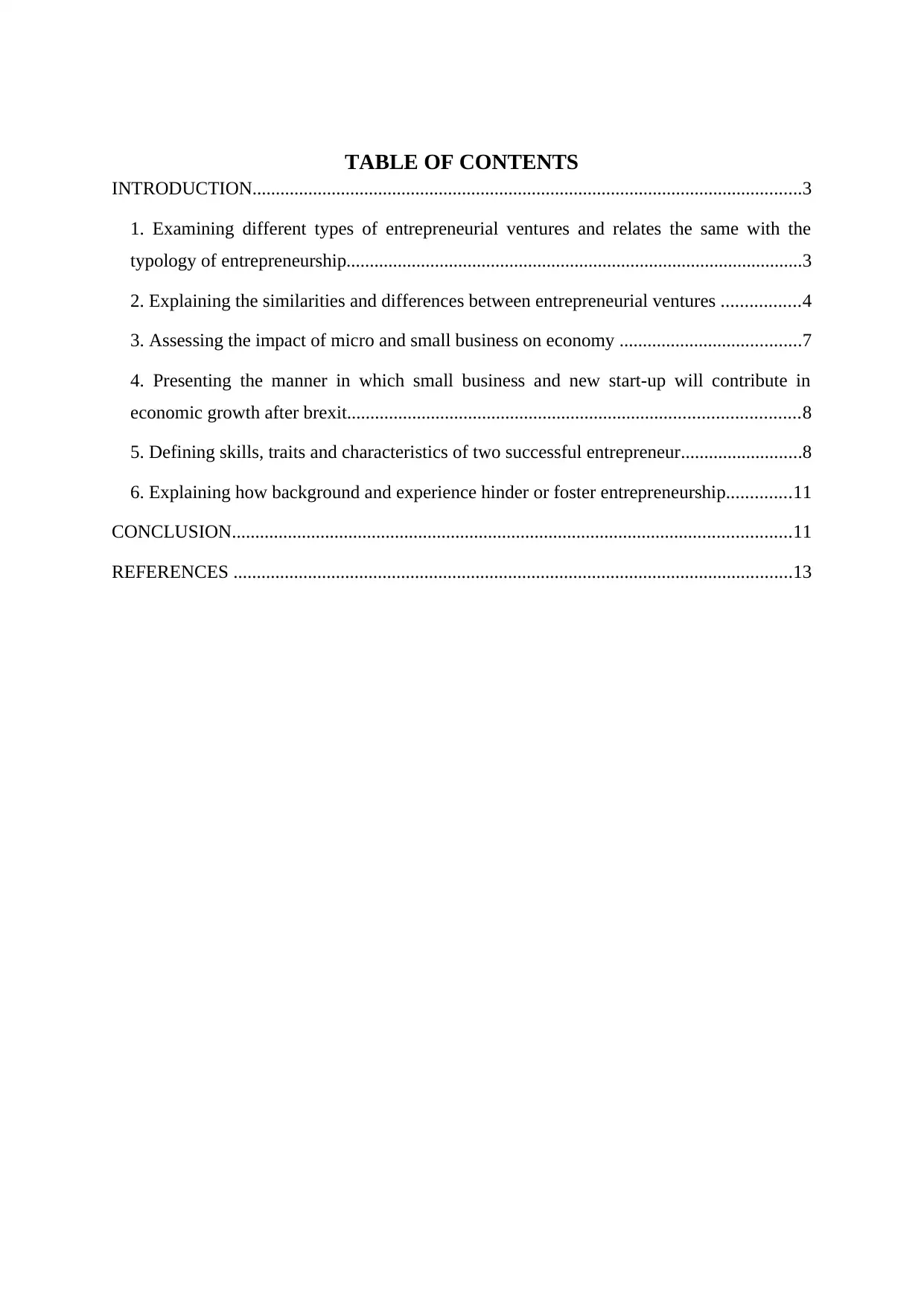
TABLE OF CONTENTS
INTRODUCTION......................................................................................................................3
1. Examining different types of entrepreneurial ventures and relates the same with the
typology of entrepreneurship..................................................................................................3
2. Explaining the similarities and differences between entrepreneurial ventures .................4
3. Assessing the impact of micro and small business on economy .......................................7
4. Presenting the manner in which small business and new start-up will contribute in
economic growth after brexit.................................................................................................8
5. Defining skills, traits and characteristics of two successful entrepreneur..........................8
6. Explaining how background and experience hinder or foster entrepreneurship..............11
CONCLUSION........................................................................................................................11
REFERENCES ........................................................................................................................13
INTRODUCTION......................................................................................................................3
1. Examining different types of entrepreneurial ventures and relates the same with the
typology of entrepreneurship..................................................................................................3
2. Explaining the similarities and differences between entrepreneurial ventures .................4
3. Assessing the impact of micro and small business on economy .......................................7
4. Presenting the manner in which small business and new start-up will contribute in
economic growth after brexit.................................................................................................8
5. Defining skills, traits and characteristics of two successful entrepreneur..........................8
6. Explaining how background and experience hinder or foster entrepreneurship..............11
CONCLUSION........................................................................................................................11
REFERENCES ........................................................................................................................13
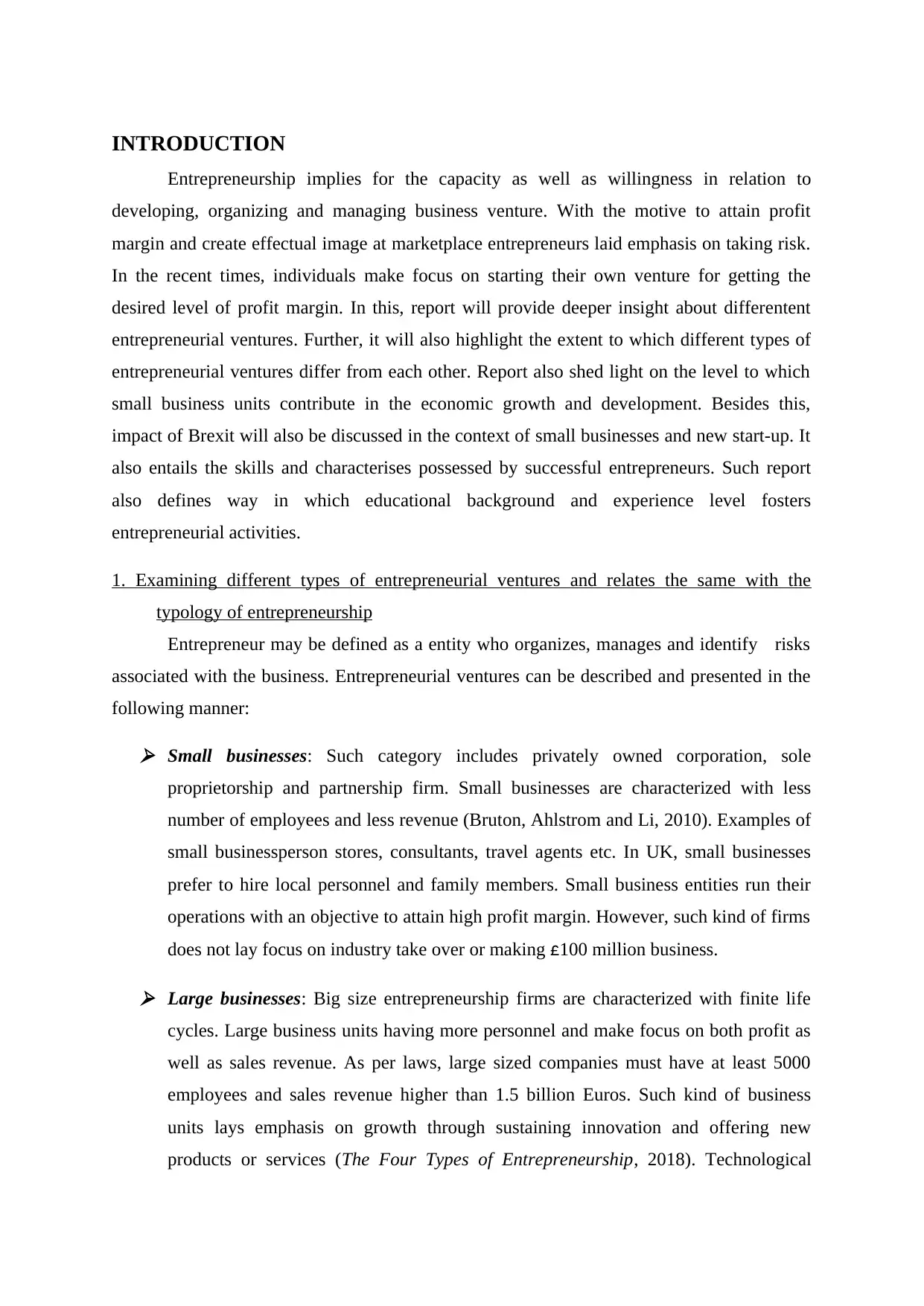
INTRODUCTION
Entrepreneurship implies for the capacity as well as willingness in relation to
developing, organizing and managing business venture. With the motive to attain profit
margin and create effectual image at marketplace entrepreneurs laid emphasis on taking risk.
In the recent times, individuals make focus on starting their own venture for getting the
desired level of profit margin. In this, report will provide deeper insight about differentent
entrepreneurial ventures. Further, it will also highlight the extent to which different types of
entrepreneurial ventures differ from each other. Report also shed light on the level to which
small business units contribute in the economic growth and development. Besides this,
impact of Brexit will also be discussed in the context of small businesses and new start-up. It
also entails the skills and characterises possessed by successful entrepreneurs. Such report
also defines way in which educational background and experience level fosters
entrepreneurial activities.
1. Examining different types of entrepreneurial ventures and relates the same with the
typology of entrepreneurship
Entrepreneur may be defined as a entity who organizes, manages and identify risks
associated with the business. Entrepreneurial ventures can be described and presented in the
following manner:
Small businesses: Such category includes privately owned corporation, sole
proprietorship and partnership firm. Small businesses are characterized with less
number of employees and less revenue (Bruton, Ahlstrom and Li, 2010). Examples of
small businessperson stores, consultants, travel agents etc. In UK, small businesses
prefer to hire local personnel and family members. Small business entities run their
operations with an objective to attain high profit margin. However, such kind of firms
does not lay focus on industry take over or making £100 million business.
Large businesses: Big size entrepreneurship firms are characterized with finite life
cycles. Large business units having more personnel and make focus on both profit as
well as sales revenue. As per laws, large sized companies must have at least 5000
employees and sales revenue higher than 1.5 billion Euros. Such kind of business
units lays emphasis on growth through sustaining innovation and offering new
products or services (The Four Types of Entrepreneurship, 2018). Technological
Entrepreneurship implies for the capacity as well as willingness in relation to
developing, organizing and managing business venture. With the motive to attain profit
margin and create effectual image at marketplace entrepreneurs laid emphasis on taking risk.
In the recent times, individuals make focus on starting their own venture for getting the
desired level of profit margin. In this, report will provide deeper insight about differentent
entrepreneurial ventures. Further, it will also highlight the extent to which different types of
entrepreneurial ventures differ from each other. Report also shed light on the level to which
small business units contribute in the economic growth and development. Besides this,
impact of Brexit will also be discussed in the context of small businesses and new start-up. It
also entails the skills and characterises possessed by successful entrepreneurs. Such report
also defines way in which educational background and experience level fosters
entrepreneurial activities.
1. Examining different types of entrepreneurial ventures and relates the same with the
typology of entrepreneurship
Entrepreneur may be defined as a entity who organizes, manages and identify risks
associated with the business. Entrepreneurial ventures can be described and presented in the
following manner:
Small businesses: Such category includes privately owned corporation, sole
proprietorship and partnership firm. Small businesses are characterized with less
number of employees and less revenue (Bruton, Ahlstrom and Li, 2010). Examples of
small businessperson stores, consultants, travel agents etc. In UK, small businesses
prefer to hire local personnel and family members. Small business entities run their
operations with an objective to attain high profit margin. However, such kind of firms
does not lay focus on industry take over or making £100 million business.
Large businesses: Big size entrepreneurship firms are characterized with finite life
cycles. Large business units having more personnel and make focus on both profit as
well as sales revenue. As per laws, large sized companies must have at least 5000
employees and sales revenue higher than 1.5 billion Euros. Such kind of business
units lays emphasis on growth through sustaining innovation and offering new
products or services (The Four Types of Entrepreneurship, 2018). Technological
⊘ This is a preview!⊘
Do you want full access?
Subscribe today to unlock all pages.

Trusted by 1+ million students worldwide
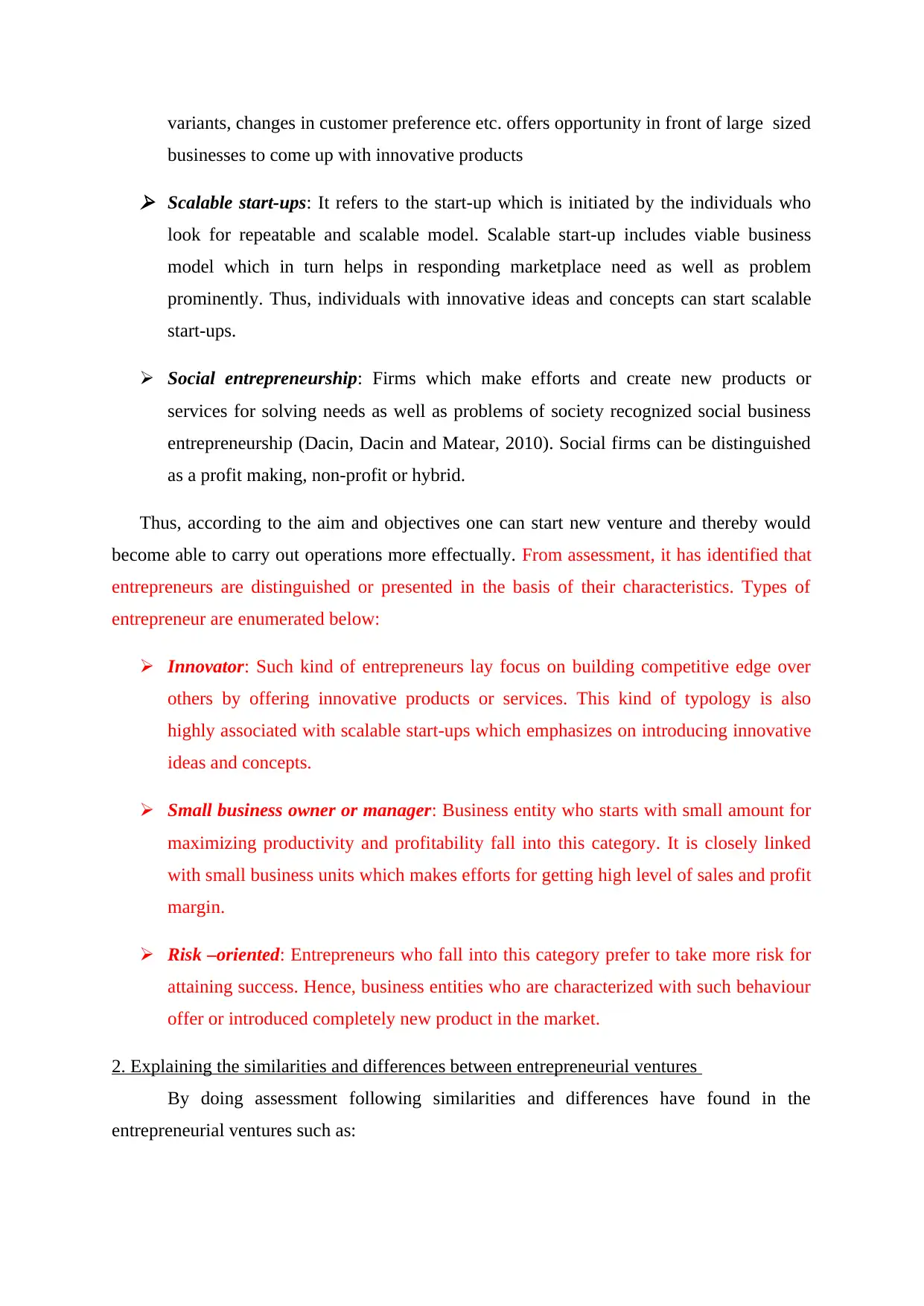
variants, changes in customer preference etc. offers opportunity in front of large sized
businesses to come up with innovative products
Scalable start-ups: It refers to the start-up which is initiated by the individuals who
look for repeatable and scalable model. Scalable start-up includes viable business
model which in turn helps in responding marketplace need as well as problem
prominently. Thus, individuals with innovative ideas and concepts can start scalable
start-ups.
Social entrepreneurship: Firms which make efforts and create new products or
services for solving needs as well as problems of society recognized social business
entrepreneurship (Dacin, Dacin and Matear, 2010). Social firms can be distinguished
as a profit making, non-profit or hybrid.
Thus, according to the aim and objectives one can start new venture and thereby would
become able to carry out operations more effectually. From assessment, it has identified that
entrepreneurs are distinguished or presented in the basis of their characteristics. Types of
entrepreneur are enumerated below:
Innovator: Such kind of entrepreneurs lay focus on building competitive edge over
others by offering innovative products or services. This kind of typology is also
highly associated with scalable start-ups which emphasizes on introducing innovative
ideas and concepts.
Small business owner or manager: Business entity who starts with small amount for
maximizing productivity and profitability fall into this category. It is closely linked
with small business units which makes efforts for getting high level of sales and profit
margin.
Risk –oriented: Entrepreneurs who fall into this category prefer to take more risk for
attaining success. Hence, business entities who are characterized with such behaviour
offer or introduced completely new product in the market.
2. Explaining the similarities and differences between entrepreneurial ventures
By doing assessment following similarities and differences have found in the
entrepreneurial ventures such as:
businesses to come up with innovative products
Scalable start-ups: It refers to the start-up which is initiated by the individuals who
look for repeatable and scalable model. Scalable start-up includes viable business
model which in turn helps in responding marketplace need as well as problem
prominently. Thus, individuals with innovative ideas and concepts can start scalable
start-ups.
Social entrepreneurship: Firms which make efforts and create new products or
services for solving needs as well as problems of society recognized social business
entrepreneurship (Dacin, Dacin and Matear, 2010). Social firms can be distinguished
as a profit making, non-profit or hybrid.
Thus, according to the aim and objectives one can start new venture and thereby would
become able to carry out operations more effectually. From assessment, it has identified that
entrepreneurs are distinguished or presented in the basis of their characteristics. Types of
entrepreneur are enumerated below:
Innovator: Such kind of entrepreneurs lay focus on building competitive edge over
others by offering innovative products or services. This kind of typology is also
highly associated with scalable start-ups which emphasizes on introducing innovative
ideas and concepts.
Small business owner or manager: Business entity who starts with small amount for
maximizing productivity and profitability fall into this category. It is closely linked
with small business units which makes efforts for getting high level of sales and profit
margin.
Risk –oriented: Entrepreneurs who fall into this category prefer to take more risk for
attaining success. Hence, business entities who are characterized with such behaviour
offer or introduced completely new product in the market.
2. Explaining the similarities and differences between entrepreneurial ventures
By doing assessment following similarities and differences have found in the
entrepreneurial ventures such as:
Paraphrase This Document
Need a fresh take? Get an instant paraphrase of this document with our AI Paraphraser
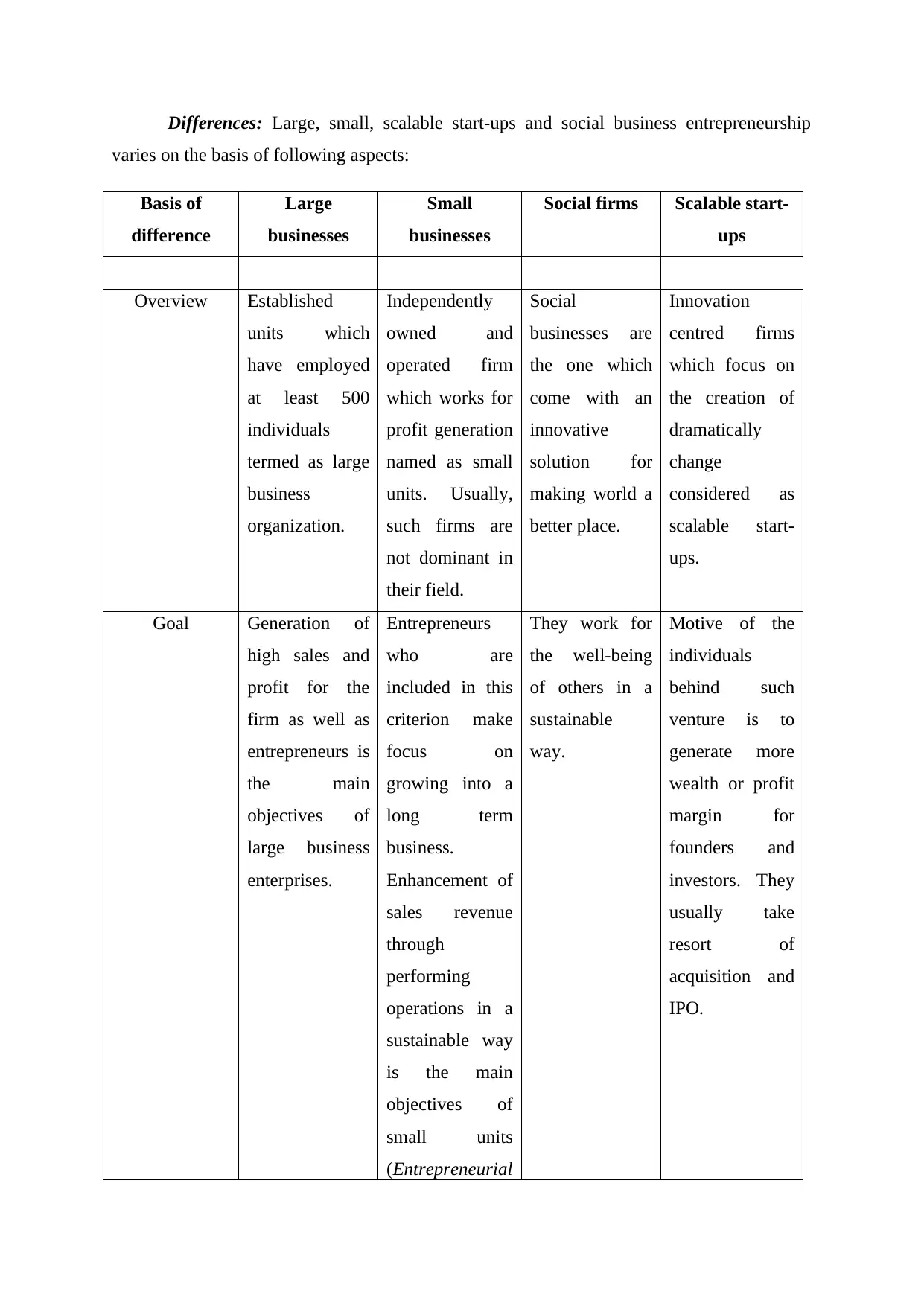
Differences: Large, small, scalable start-ups and social business entrepreneurship
varies on the basis of following aspects:
Basis of
difference
Large
businesses
Small
businesses
Social firms Scalable start-
ups
Overview Established
units which
have employed
at least 500
individuals
termed as large
business
organization.
Independently
owned and
operated firm
which works for
profit generation
named as small
units. Usually,
such firms are
not dominant in
their field.
Social
businesses are
the one which
come with an
innovative
solution for
making world a
better place.
Innovation
centred firms
which focus on
the creation of
dramatically
change
considered as
scalable start-
ups.
Goal Generation of
high sales and
profit for the
firm as well as
entrepreneurs is
the main
objectives of
large business
enterprises.
Entrepreneurs
who are
included in this
criterion make
focus on
growing into a
long term
business.
Enhancement of
sales revenue
through
performing
operations in a
sustainable way
is the main
objectives of
small units
(Entrepreneurial
They work for
the well-being
of others in a
sustainable
way.
Motive of the
individuals
behind such
venture is to
generate more
wealth or profit
margin for
founders and
investors. They
usually take
resort of
acquisition and
IPO.
varies on the basis of following aspects:
Basis of
difference
Large
businesses
Small
businesses
Social firms Scalable start-
ups
Overview Established
units which
have employed
at least 500
individuals
termed as large
business
organization.
Independently
owned and
operated firm
which works for
profit generation
named as small
units. Usually,
such firms are
not dominant in
their field.
Social
businesses are
the one which
come with an
innovative
solution for
making world a
better place.
Innovation
centred firms
which focus on
the creation of
dramatically
change
considered as
scalable start-
ups.
Goal Generation of
high sales and
profit for the
firm as well as
entrepreneurs is
the main
objectives of
large business
enterprises.
Entrepreneurs
who are
included in this
criterion make
focus on
growing into a
long term
business.
Enhancement of
sales revenue
through
performing
operations in a
sustainable way
is the main
objectives of
small units
(Entrepreneurial
They work for
the well-being
of others in a
sustainable
way.
Motive of the
individuals
behind such
venture is to
generate more
wealth or profit
margin for
founders and
investors. They
usually take
resort of
acquisition and
IPO.
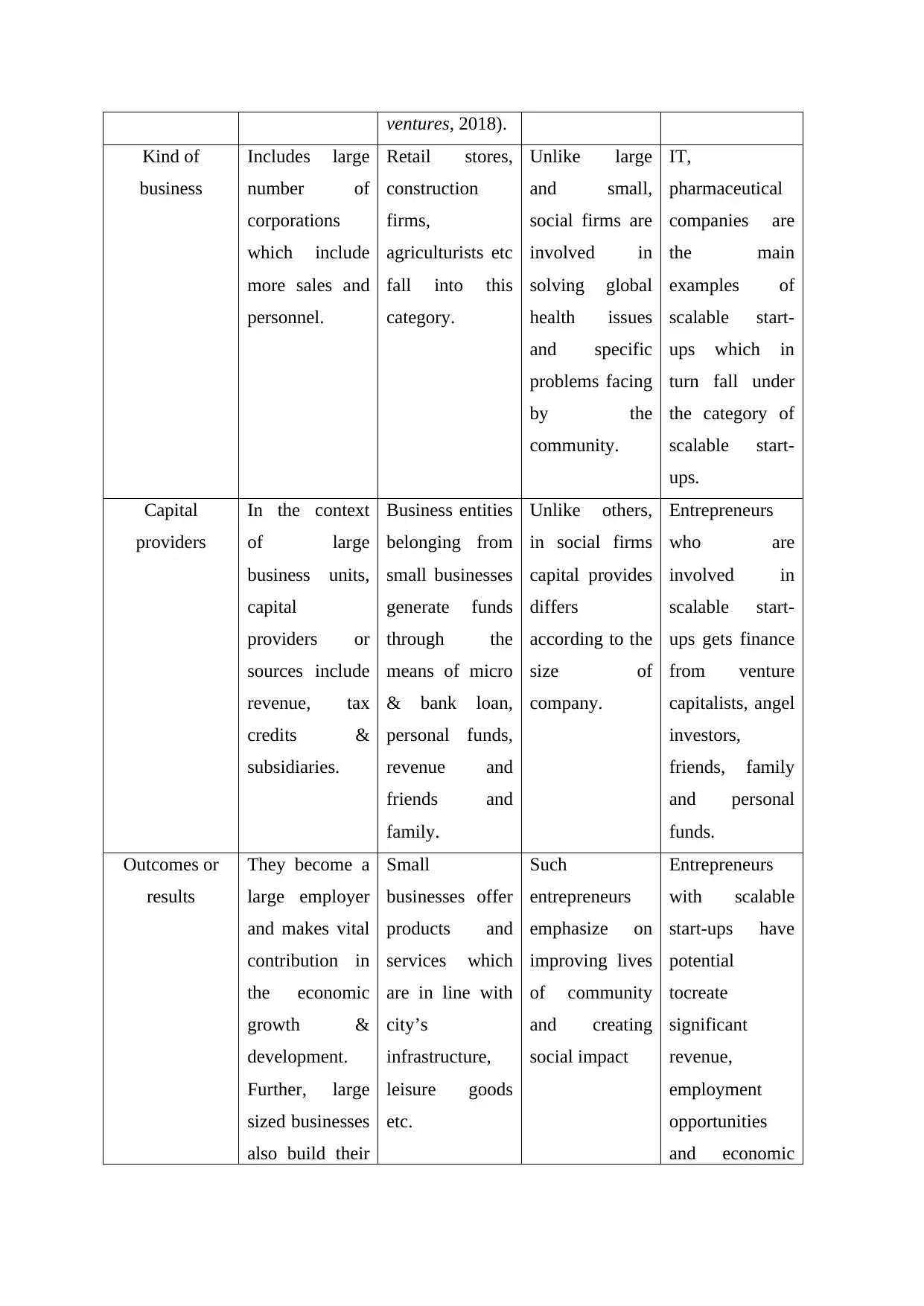
ventures, 2018).
Kind of
business
Includes large
number of
corporations
which include
more sales and
personnel.
Retail stores,
construction
firms,
agriculturists etc
fall into this
category.
Unlike large
and small,
social firms are
involved in
solving global
health issues
and specific
problems facing
by the
community.
IT,
pharmaceutical
companies are
the main
examples of
scalable start-
ups which in
turn fall under
the category of
scalable start-
ups.
Capital
providers
In the context
of large
business units,
capital
providers or
sources include
revenue, tax
credits &
subsidiaries.
Business entities
belonging from
small businesses
generate funds
through the
means of micro
& bank loan,
personal funds,
revenue and
friends and
family.
Unlike others,
in social firms
capital provides
differs
according to the
size of
company.
Entrepreneurs
who are
involved in
scalable start-
ups gets finance
from venture
capitalists, angel
investors,
friends, family
and personal
funds.
Outcomes or
results
They become a
large employer
and makes vital
contribution in
the economic
growth &
development.
Further, large
sized businesses
also build their
Small
businesses offer
products and
services which
are in line with
city’s
infrastructure,
leisure goods
etc.
Such
entrepreneurs
emphasize on
improving lives
of community
and creating
social impact
Entrepreneurs
with scalable
start-ups have
potential
tocreate
significant
revenue,
employment
opportunities
and economic
Kind of
business
Includes large
number of
corporations
which include
more sales and
personnel.
Retail stores,
construction
firms,
agriculturists etc
fall into this
category.
Unlike large
and small,
social firms are
involved in
solving global
health issues
and specific
problems facing
by the
community.
IT,
pharmaceutical
companies are
the main
examples of
scalable start-
ups which in
turn fall under
the category of
scalable start-
ups.
Capital
providers
In the context
of large
business units,
capital
providers or
sources include
revenue, tax
credits &
subsidiaries.
Business entities
belonging from
small businesses
generate funds
through the
means of micro
& bank loan,
personal funds,
revenue and
friends and
family.
Unlike others,
in social firms
capital provides
differs
according to the
size of
company.
Entrepreneurs
who are
involved in
scalable start-
ups gets finance
from venture
capitalists, angel
investors,
friends, family
and personal
funds.
Outcomes or
results
They become a
large employer
and makes vital
contribution in
the economic
growth &
development.
Further, large
sized businesses
also build their
Small
businesses offer
products and
services which
are in line with
city’s
infrastructure,
leisure goods
etc.
Such
entrepreneurs
emphasize on
improving lives
of community
and creating
social impact
Entrepreneurs
with scalable
start-ups have
potential
tocreate
significant
revenue,
employment
opportunities
and economic
⊘ This is a preview!⊘
Do you want full access?
Subscribe today to unlock all pages.

Trusted by 1+ million students worldwide
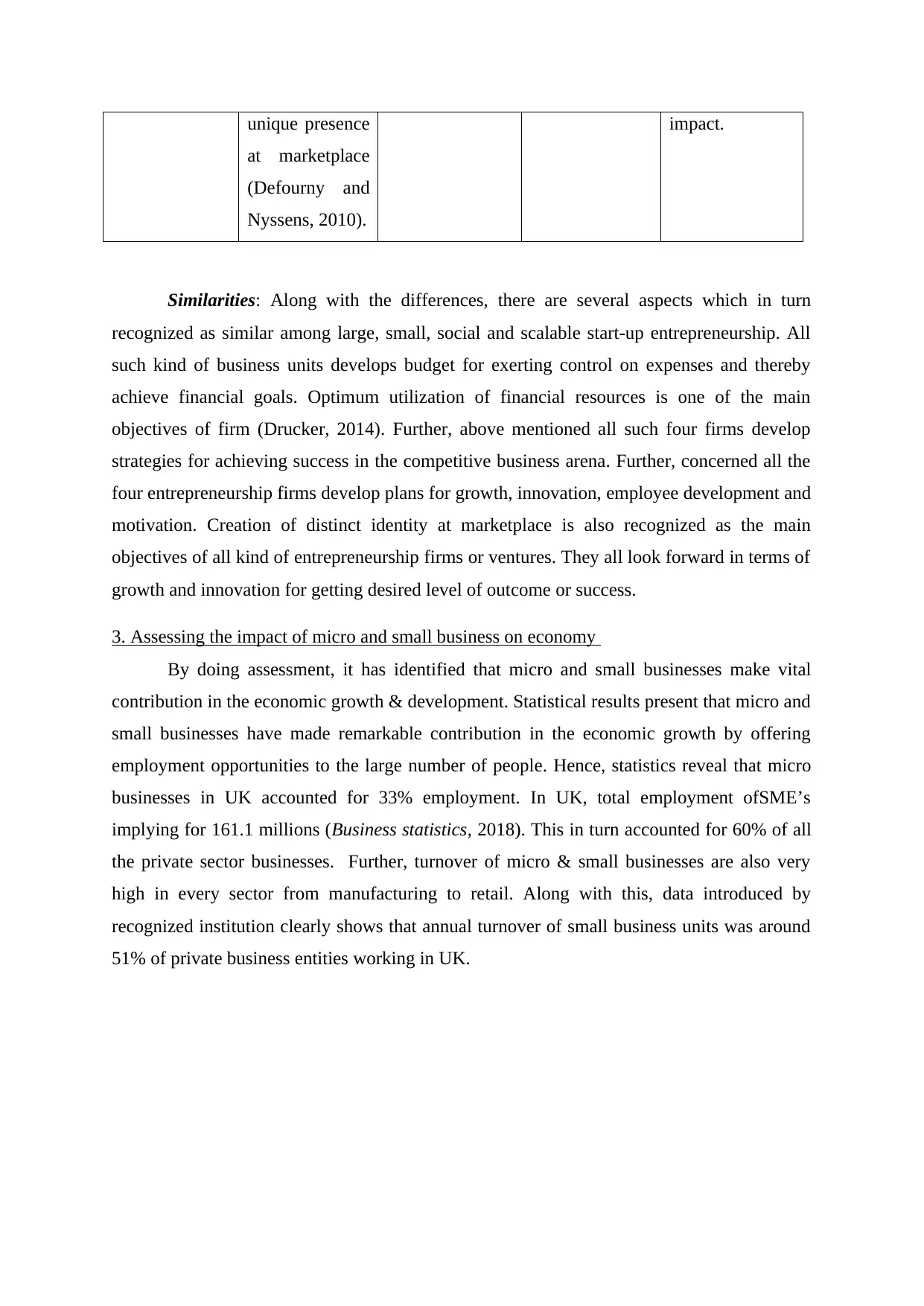
unique presence
at marketplace
(Defourny and
Nyssens, 2010).
impact.
Similarities: Along with the differences, there are several aspects which in turn
recognized as similar among large, small, social and scalable start-up entrepreneurship. All
such kind of business units develops budget for exerting control on expenses and thereby
achieve financial goals. Optimum utilization of financial resources is one of the main
objectives of firm (Drucker, 2014). Further, above mentioned all such four firms develop
strategies for achieving success in the competitive business arena. Further, concerned all the
four entrepreneurship firms develop plans for growth, innovation, employee development and
motivation. Creation of distinct identity at marketplace is also recognized as the main
objectives of all kind of entrepreneurship firms or ventures. They all look forward in terms of
growth and innovation for getting desired level of outcome or success.
3. Assessing the impact of micro and small business on economy
By doing assessment, it has identified that micro and small businesses make vital
contribution in the economic growth & development. Statistical results present that micro and
small businesses have made remarkable contribution in the economic growth by offering
employment opportunities to the large number of people. Hence, statistics reveal that micro
businesses in UK accounted for 33% employment. In UK, total employment ofSME’s
implying for 161.1 millions (Business statistics, 2018). This in turn accounted for 60% of all
the private sector businesses. Further, turnover of micro & small businesses are also very
high in every sector from manufacturing to retail. Along with this, data introduced by
recognized institution clearly shows that annual turnover of small business units was around
51% of private business entities working in UK.
at marketplace
(Defourny and
Nyssens, 2010).
impact.
Similarities: Along with the differences, there are several aspects which in turn
recognized as similar among large, small, social and scalable start-up entrepreneurship. All
such kind of business units develops budget for exerting control on expenses and thereby
achieve financial goals. Optimum utilization of financial resources is one of the main
objectives of firm (Drucker, 2014). Further, above mentioned all such four firms develop
strategies for achieving success in the competitive business arena. Further, concerned all the
four entrepreneurship firms develop plans for growth, innovation, employee development and
motivation. Creation of distinct identity at marketplace is also recognized as the main
objectives of all kind of entrepreneurship firms or ventures. They all look forward in terms of
growth and innovation for getting desired level of outcome or success.
3. Assessing the impact of micro and small business on economy
By doing assessment, it has identified that micro and small businesses make vital
contribution in the economic growth & development. Statistical results present that micro and
small businesses have made remarkable contribution in the economic growth by offering
employment opportunities to the large number of people. Hence, statistics reveal that micro
businesses in UK accounted for 33% employment. In UK, total employment ofSME’s
implying for 161.1 millions (Business statistics, 2018). This in turn accounted for 60% of all
the private sector businesses. Further, turnover of micro & small businesses are also very
high in every sector from manufacturing to retail. Along with this, data introduced by
recognized institution clearly shows that annual turnover of small business units was around
51% of private business entities working in UK.
Paraphrase This Document
Need a fresh take? Get an instant paraphrase of this document with our AI Paraphraser
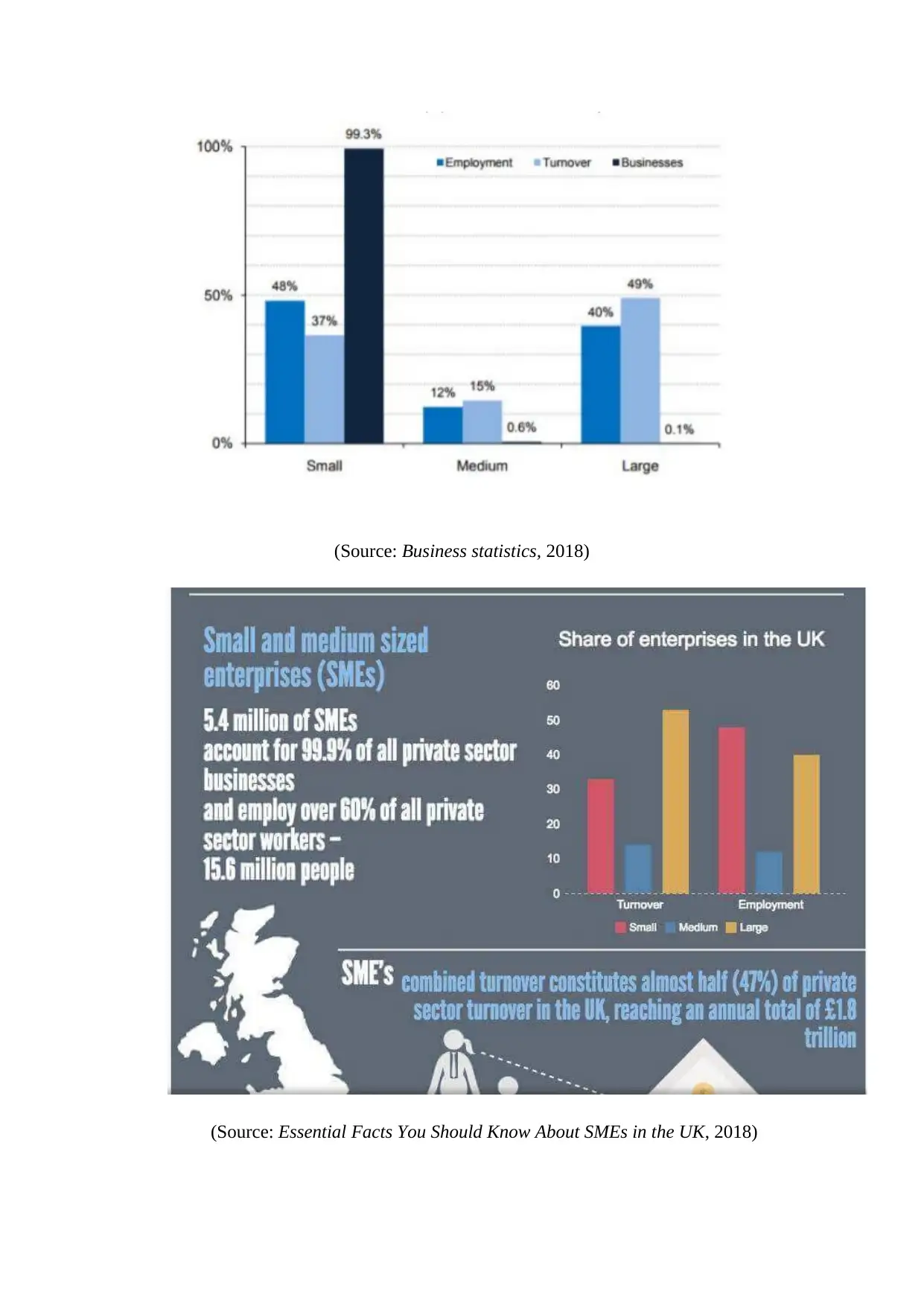
(Source: Business statistics, 2018)
(Source: Essential Facts You Should Know About SMEs in the UK, 2018)
(Source: Essential Facts You Should Know About SMEs in the UK, 2018)
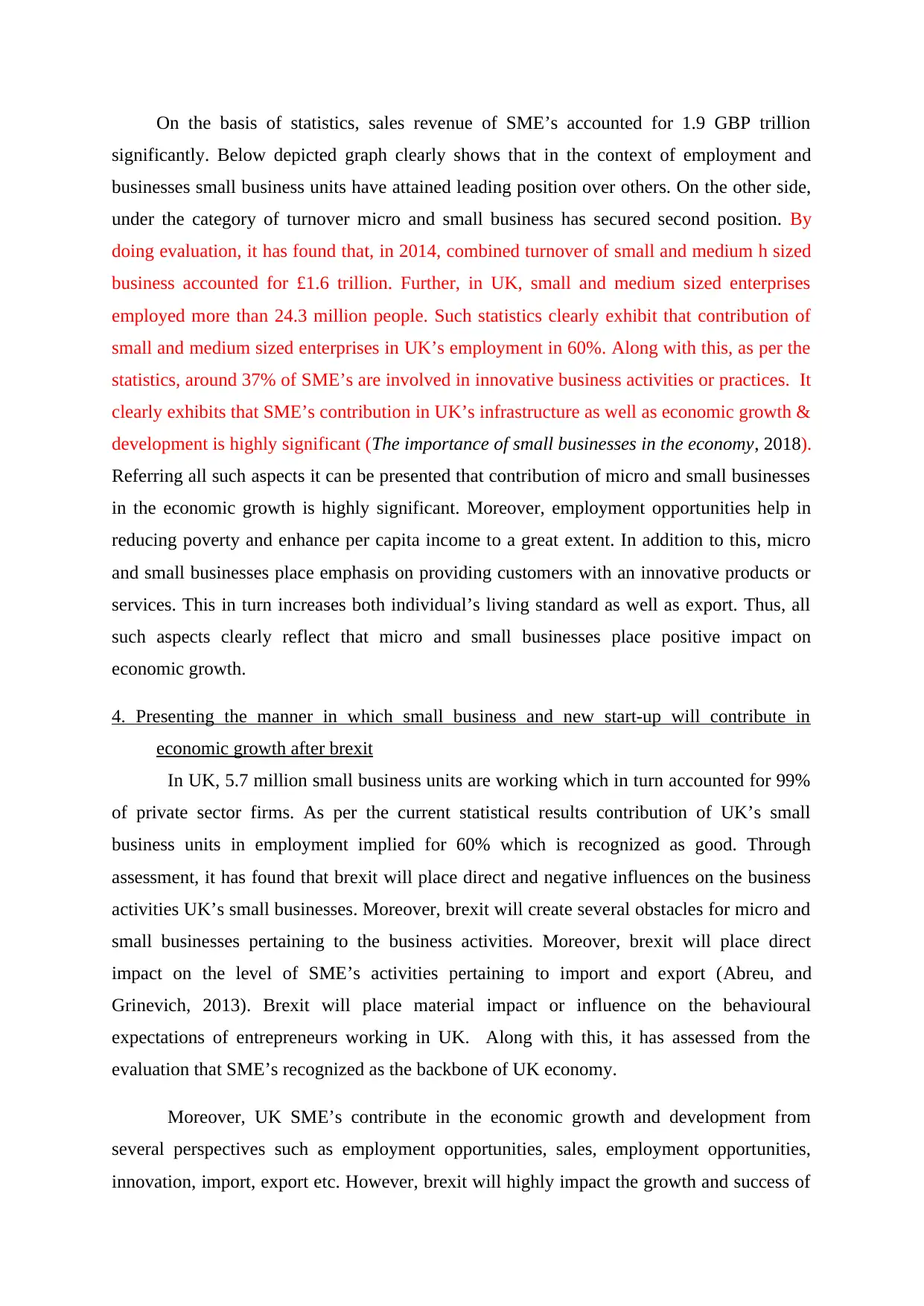
On the basis of statistics, sales revenue of SME’s accounted for 1.9 GBP trillion
significantly. Below depicted graph clearly shows that in the context of employment and
businesses small business units have attained leading position over others. On the other side,
under the category of turnover micro and small business has secured second position. By
doing evaluation, it has found that, in 2014, combined turnover of small and medium h sized
business accounted for £1.6 trillion. Further, in UK, small and medium sized enterprises
employed more than 24.3 million people. Such statistics clearly exhibit that contribution of
small and medium sized enterprises in UK’s employment in 60%. Along with this, as per the
statistics, around 37% of SME’s are involved in innovative business activities or practices. It
clearly exhibits that SME’s contribution in UK’s infrastructure as well as economic growth &
development is highly significant (The importance of small businesses in the economy, 2018).
Referring all such aspects it can be presented that contribution of micro and small businesses
in the economic growth is highly significant. Moreover, employment opportunities help in
reducing poverty and enhance per capita income to a great extent. In addition to this, micro
and small businesses place emphasis on providing customers with an innovative products or
services. This in turn increases both individual’s living standard as well as export. Thus, all
such aspects clearly reflect that micro and small businesses place positive impact on
economic growth.
4. Presenting the manner in which small business and new start-up will contribute in
economic growth after brexit
In UK, 5.7 million small business units are working which in turn accounted for 99%
of private sector firms. As per the current statistical results contribution of UK’s small
business units in employment implied for 60% which is recognized as good. Through
assessment, it has found that brexit will place direct and negative influences on the business
activities UK’s small businesses. Moreover, brexit will create several obstacles for micro and
small businesses pertaining to the business activities. Moreover, brexit will place direct
impact on the level of SME’s activities pertaining to import and export (Abreu, and
Grinevich, 2013). Brexit will place material impact or influence on the behavioural
expectations of entrepreneurs working in UK. Along with this, it has assessed from the
evaluation that SME’s recognized as the backbone of UK economy.
Moreover, UK SME’s contribute in the economic growth and development from
several perspectives such as employment opportunities, sales, employment opportunities,
innovation, import, export etc. However, brexit will highly impact the growth and success of
significantly. Below depicted graph clearly shows that in the context of employment and
businesses small business units have attained leading position over others. On the other side,
under the category of turnover micro and small business has secured second position. By
doing evaluation, it has found that, in 2014, combined turnover of small and medium h sized
business accounted for £1.6 trillion. Further, in UK, small and medium sized enterprises
employed more than 24.3 million people. Such statistics clearly exhibit that contribution of
small and medium sized enterprises in UK’s employment in 60%. Along with this, as per the
statistics, around 37% of SME’s are involved in innovative business activities or practices. It
clearly exhibits that SME’s contribution in UK’s infrastructure as well as economic growth &
development is highly significant (The importance of small businesses in the economy, 2018).
Referring all such aspects it can be presented that contribution of micro and small businesses
in the economic growth is highly significant. Moreover, employment opportunities help in
reducing poverty and enhance per capita income to a great extent. In addition to this, micro
and small businesses place emphasis on providing customers with an innovative products or
services. This in turn increases both individual’s living standard as well as export. Thus, all
such aspects clearly reflect that micro and small businesses place positive impact on
economic growth.
4. Presenting the manner in which small business and new start-up will contribute in
economic growth after brexit
In UK, 5.7 million small business units are working which in turn accounted for 99%
of private sector firms. As per the current statistical results contribution of UK’s small
business units in employment implied for 60% which is recognized as good. Through
assessment, it has found that brexit will place direct and negative influences on the business
activities UK’s small businesses. Moreover, brexit will create several obstacles for micro and
small businesses pertaining to the business activities. Moreover, brexit will place direct
impact on the level of SME’s activities pertaining to import and export (Abreu, and
Grinevich, 2013). Brexit will place material impact or influence on the behavioural
expectations of entrepreneurs working in UK. Along with this, it has assessed from the
evaluation that SME’s recognized as the backbone of UK economy.
Moreover, UK SME’s contribute in the economic growth and development from
several perspectives such as employment opportunities, sales, employment opportunities,
innovation, import, export etc. However, brexit will highly impact the growth and success of
⊘ This is a preview!⊘
Do you want full access?
Subscribe today to unlock all pages.

Trusted by 1+ million students worldwide
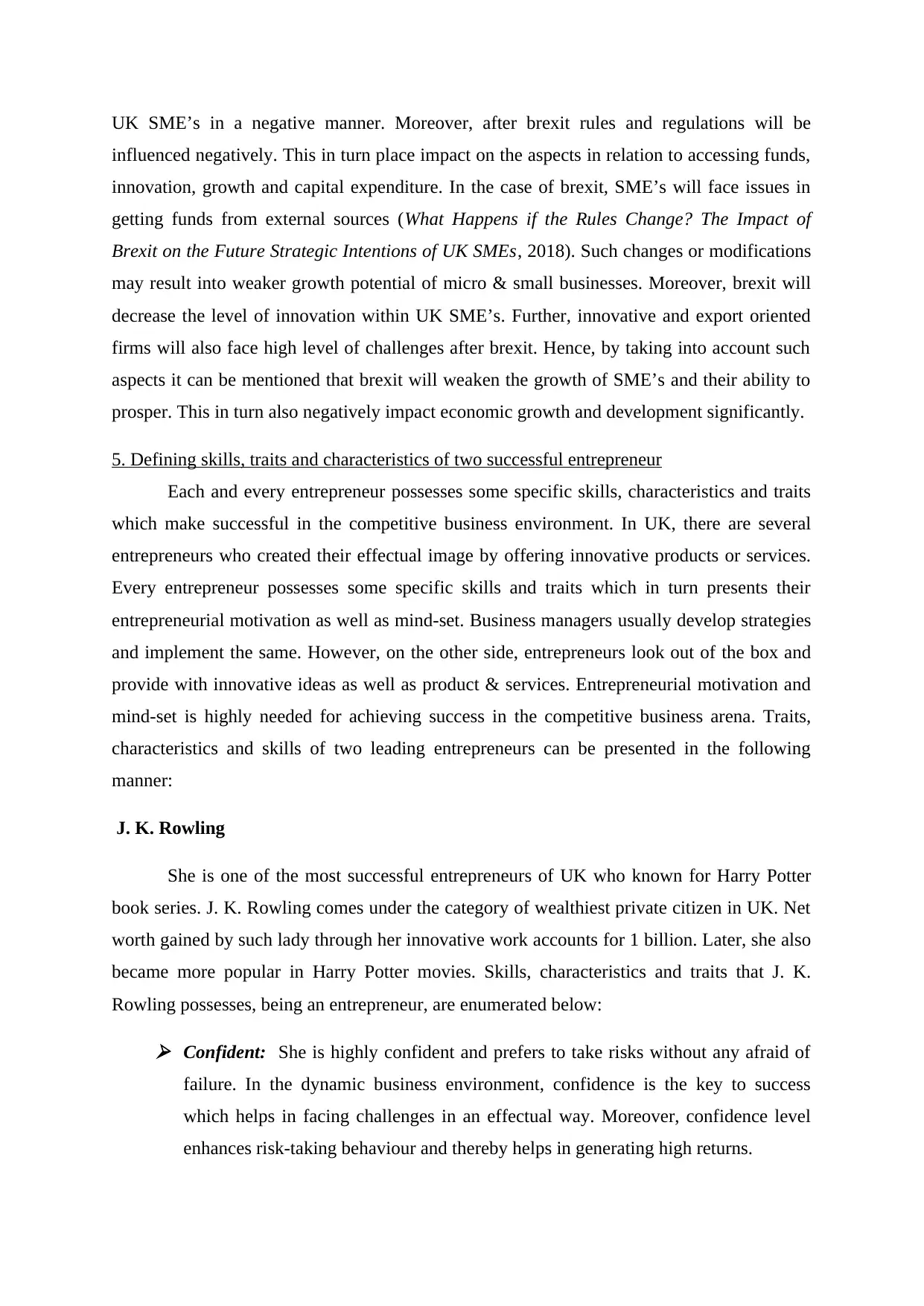
UK SME’s in a negative manner. Moreover, after brexit rules and regulations will be
influenced negatively. This in turn place impact on the aspects in relation to accessing funds,
innovation, growth and capital expenditure. In the case of brexit, SME’s will face issues in
getting funds from external sources (What Happens if the Rules Change? The Impact of
Brexit on the Future Strategic Intentions of UK SMEs, 2018). Such changes or modifications
may result into weaker growth potential of micro & small businesses. Moreover, brexit will
decrease the level of innovation within UK SME’s. Further, innovative and export oriented
firms will also face high level of challenges after brexit. Hence, by taking into account such
aspects it can be mentioned that brexit will weaken the growth of SME’s and their ability to
prosper. This in turn also negatively impact economic growth and development significantly.
5. Defining skills, traits and characteristics of two successful entrepreneur
Each and every entrepreneur possesses some specific skills, characteristics and traits
which make successful in the competitive business environment. In UK, there are several
entrepreneurs who created their effectual image by offering innovative products or services.
Every entrepreneur possesses some specific skills and traits which in turn presents their
entrepreneurial motivation as well as mind-set. Business managers usually develop strategies
and implement the same. However, on the other side, entrepreneurs look out of the box and
provide with innovative ideas as well as product & services. Entrepreneurial motivation and
mind-set is highly needed for achieving success in the competitive business arena. Traits,
characteristics and skills of two leading entrepreneurs can be presented in the following
manner:
J. K. Rowling
She is one of the most successful entrepreneurs of UK who known for Harry Potter
book series. J. K. Rowling comes under the category of wealthiest private citizen in UK. Net
worth gained by such lady through her innovative work accounts for 1 billion. Later, she also
became more popular in Harry Potter movies. Skills, characteristics and traits that J. K.
Rowling possesses, being an entrepreneur, are enumerated below: Confident: She is highly confident and prefers to take risks without any afraid of
failure. In the dynamic business environment, confidence is the key to success
which helps in facing challenges in an effectual way. Moreover, confidence level
enhances risk-taking behaviour and thereby helps in generating high returns.
influenced negatively. This in turn place impact on the aspects in relation to accessing funds,
innovation, growth and capital expenditure. In the case of brexit, SME’s will face issues in
getting funds from external sources (What Happens if the Rules Change? The Impact of
Brexit on the Future Strategic Intentions of UK SMEs, 2018). Such changes or modifications
may result into weaker growth potential of micro & small businesses. Moreover, brexit will
decrease the level of innovation within UK SME’s. Further, innovative and export oriented
firms will also face high level of challenges after brexit. Hence, by taking into account such
aspects it can be mentioned that brexit will weaken the growth of SME’s and their ability to
prosper. This in turn also negatively impact economic growth and development significantly.
5. Defining skills, traits and characteristics of two successful entrepreneur
Each and every entrepreneur possesses some specific skills, characteristics and traits
which make successful in the competitive business environment. In UK, there are several
entrepreneurs who created their effectual image by offering innovative products or services.
Every entrepreneur possesses some specific skills and traits which in turn presents their
entrepreneurial motivation as well as mind-set. Business managers usually develop strategies
and implement the same. However, on the other side, entrepreneurs look out of the box and
provide with innovative ideas as well as product & services. Entrepreneurial motivation and
mind-set is highly needed for achieving success in the competitive business arena. Traits,
characteristics and skills of two leading entrepreneurs can be presented in the following
manner:
J. K. Rowling
She is one of the most successful entrepreneurs of UK who known for Harry Potter
book series. J. K. Rowling comes under the category of wealthiest private citizen in UK. Net
worth gained by such lady through her innovative work accounts for 1 billion. Later, she also
became more popular in Harry Potter movies. Skills, characteristics and traits that J. K.
Rowling possesses, being an entrepreneur, are enumerated below: Confident: She is highly confident and prefers to take risks without any afraid of
failure. In the dynamic business environment, confidence is the key to success
which helps in facing challenges in an effectual way. Moreover, confidence level
enhances risk-taking behaviour and thereby helps in generating high returns.
Paraphrase This Document
Need a fresh take? Get an instant paraphrase of this document with our AI Paraphraser
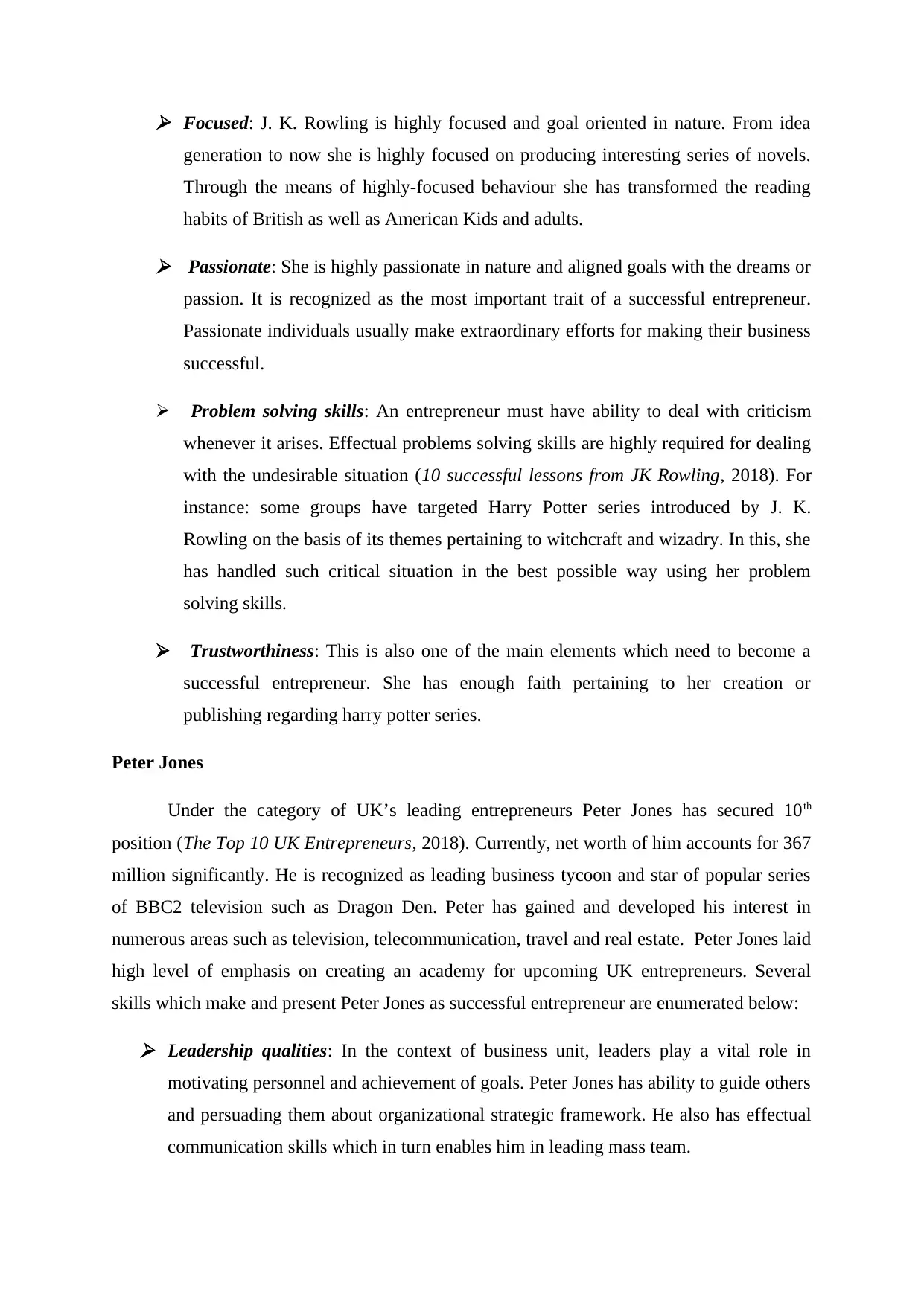
Focused: J. K. Rowling is highly focused and goal oriented in nature. From idea
generation to now she is highly focused on producing interesting series of novels.
Through the means of highly-focused behaviour she has transformed the reading
habits of British as well as American Kids and adults. Passionate: She is highly passionate in nature and aligned goals with the dreams or
passion. It is recognized as the most important trait of a successful entrepreneur.
Passionate individuals usually make extraordinary efforts for making their business
successful.
Problem solving skills: An entrepreneur must have ability to deal with criticism
whenever it arises. Effectual problems solving skills are highly required for dealing
with the undesirable situation (10 successful lessons from JK Rowling, 2018). For
instance: some groups have targeted Harry Potter series introduced by J. K.
Rowling on the basis of its themes pertaining to witchcraft and wizadry. In this, she
has handled such critical situation in the best possible way using her problem
solving skills.
Trustworthiness: This is also one of the main elements which need to become a
successful entrepreneur. She has enough faith pertaining to her creation or
publishing regarding harry potter series.
Peter Jones
Under the category of UK’s leading entrepreneurs Peter Jones has secured 10th
position (The Top 10 UK Entrepreneurs, 2018). Currently, net worth of him accounts for 367
million significantly. He is recognized as leading business tycoon and star of popular series
of BBC2 television such as Dragon Den. Peter has gained and developed his interest in
numerous areas such as television, telecommunication, travel and real estate. Peter Jones laid
high level of emphasis on creating an academy for upcoming UK entrepreneurs. Several
skills which make and present Peter Jones as successful entrepreneur are enumerated below:
Leadership qualities: In the context of business unit, leaders play a vital role in
motivating personnel and achievement of goals. Peter Jones has ability to guide others
and persuading them about organizational strategic framework. He also has effectual
communication skills which in turn enables him in leading mass team.
generation to now she is highly focused on producing interesting series of novels.
Through the means of highly-focused behaviour she has transformed the reading
habits of British as well as American Kids and adults. Passionate: She is highly passionate in nature and aligned goals with the dreams or
passion. It is recognized as the most important trait of a successful entrepreneur.
Passionate individuals usually make extraordinary efforts for making their business
successful.
Problem solving skills: An entrepreneur must have ability to deal with criticism
whenever it arises. Effectual problems solving skills are highly required for dealing
with the undesirable situation (10 successful lessons from JK Rowling, 2018). For
instance: some groups have targeted Harry Potter series introduced by J. K.
Rowling on the basis of its themes pertaining to witchcraft and wizadry. In this, she
has handled such critical situation in the best possible way using her problem
solving skills.
Trustworthiness: This is also one of the main elements which need to become a
successful entrepreneur. She has enough faith pertaining to her creation or
publishing regarding harry potter series.
Peter Jones
Under the category of UK’s leading entrepreneurs Peter Jones has secured 10th
position (The Top 10 UK Entrepreneurs, 2018). Currently, net worth of him accounts for 367
million significantly. He is recognized as leading business tycoon and star of popular series
of BBC2 television such as Dragon Den. Peter has gained and developed his interest in
numerous areas such as television, telecommunication, travel and real estate. Peter Jones laid
high level of emphasis on creating an academy for upcoming UK entrepreneurs. Several
skills which make and present Peter Jones as successful entrepreneur are enumerated below:
Leadership qualities: In the context of business unit, leaders play a vital role in
motivating personnel and achievement of goals. Peter Jones has ability to guide others
and persuading them about organizational strategic framework. He also has effectual
communication skills which in turn enables him in leading mass team.

Highly motivated: Self-motivation is also recognized as the most important trait of
successful entrepreneur (Peter's top 10 rules to build a successful business, 2018).
Peter Jones believes that motivational aspects enhance creativity to a great extent.
Competitive spirit: Development of distinct image at marketplace is also the main trait
which an entrepreneur possesses. Peter Jones also has spirit in relation to doing job
better than others. Thus, such competitive spirit makes entrepreneur more successful.
Committed: As per Peter Jones, high level of commitment is required to become a
successful entrepreneur. Moreover, high level of commitment ensures achievement of
goals within the suitable time frame. He places more emphasis on the development of
effectual communication and organizational skills. Moreover, it assists in developing
competent plan and delivering good results.
Influencer: Peter Jones has ability in relation to influencing decision making of
others. According to him, emphasis needs to be placed on the delegation of work and
responsibilities. As, it helps in building relationship and developing business more
effectually.
Visionary: An entrepreneur must be visionary in nature that has ability in relation to
forecast future aspects. Peter Jones laid more focus on setting objectives or goals as
well as developing strategies for achieving vision.
Determination: entrepreneur are not thwarted by their defeats. They treat their defeat
as a lesson learned and took as a challenge and an opportunity to be successful. They
are determined to make all of their endeavour succeed, which will help them to be a
successful entrepreneur, s a successful entrepreneur do not believe that there are any
work that can not be done.
Passionate: it is the most important characteristics that an entrepreneur possess which
makes them successful. J.k.Rwling loves her passion of writing, every time she comes
up with a innovative idea of her story-line that helps her to be a successful
entrepreneur. The entrepreneur loves their job and ready to put all their efforts. A
successful entrepreneur should always search and research to make his business
better.
successful entrepreneur (Peter's top 10 rules to build a successful business, 2018).
Peter Jones believes that motivational aspects enhance creativity to a great extent.
Competitive spirit: Development of distinct image at marketplace is also the main trait
which an entrepreneur possesses. Peter Jones also has spirit in relation to doing job
better than others. Thus, such competitive spirit makes entrepreneur more successful.
Committed: As per Peter Jones, high level of commitment is required to become a
successful entrepreneur. Moreover, high level of commitment ensures achievement of
goals within the suitable time frame. He places more emphasis on the development of
effectual communication and organizational skills. Moreover, it assists in developing
competent plan and delivering good results.
Influencer: Peter Jones has ability in relation to influencing decision making of
others. According to him, emphasis needs to be placed on the delegation of work and
responsibilities. As, it helps in building relationship and developing business more
effectually.
Visionary: An entrepreneur must be visionary in nature that has ability in relation to
forecast future aspects. Peter Jones laid more focus on setting objectives or goals as
well as developing strategies for achieving vision.
Determination: entrepreneur are not thwarted by their defeats. They treat their defeat
as a lesson learned and took as a challenge and an opportunity to be successful. They
are determined to make all of their endeavour succeed, which will help them to be a
successful entrepreneur, s a successful entrepreneur do not believe that there are any
work that can not be done.
Passionate: it is the most important characteristics that an entrepreneur possess which
makes them successful. J.k.Rwling loves her passion of writing, every time she comes
up with a innovative idea of her story-line that helps her to be a successful
entrepreneur. The entrepreneur loves their job and ready to put all their efforts. A
successful entrepreneur should always search and research to make his business
better.
⊘ This is a preview!⊘
Do you want full access?
Subscribe today to unlock all pages.

Trusted by 1+ million students worldwide
1 out of 17
Related Documents
Your All-in-One AI-Powered Toolkit for Academic Success.
+13062052269
info@desklib.com
Available 24*7 on WhatsApp / Email
![[object Object]](/_next/static/media/star-bottom.7253800d.svg)
Unlock your academic potential
Copyright © 2020–2025 A2Z Services. All Rights Reserved. Developed and managed by ZUCOL.





